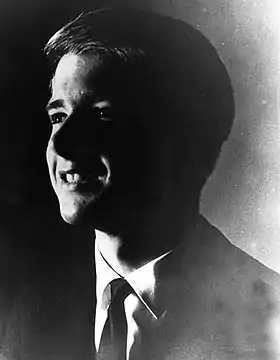Thomas W. Bennett
Thomas William Bennett, né le à Morgantown en Virginie-Occidentale et tué le dans la région de Chu Pa, province de Pleiku, pendant la guerre du Viêt Nam est un infirmier de l’armée de terre américaine. Il est le deuxième objecteur de conscience à recevoir la Medal of Honor, après Desmond Doss, un infirmier de la Seconde Guerre mondiale.
| Thomas William Bennett | ||
 | ||
| Naissance | Morgantown (Virginie-Occidentale) |
|
|---|---|---|
| Décès | 11 février 1969 (à 21 ans) Région de Chu Pa, République du Viêt Nam Mort au combat |
|
| Origine | ||
| Arme | ||
| Unité | Compagnie Bravo, 1er Battaillon, 14e régiment d'infanterie, 4e division d'infanterie | |
| Grade | ||
| Années de service | 1968 – 1969 | |
| Conflits | Guerre du Viêt Nam | |
| Distinctions | Medal of Honor Purple Heart |
|
Biographie
Né à Morgantown en Virginie-Occidentale, Thomas W. Bennett est sociable et très croyant. Il est élevé chez les Baptistes du Sud. Pendant la première année de ses études à l'université de Virginie-Occidentale, il forme le Conseil œcuménique du campus[1].
Profondément patriote mais refusant de tuer pour des raisons religieuses, il s'enrôle dans l'armée en tant qu'objecteur de conscience prêt à servir[1]. Cette classification est différente de celle d'un objecteur de conscience qui n'aidera en rien les militaires. Il est formé en tant qu'aide-soignant militaire.
Thomas Bennett arrive au Viêt Nam du Sud le et est affecté à la compagnie Bravo, 1er bataillon, 14e d'infanterie, sur les hauts plateaux du centre du Viêt Nam[2]. L'unité commence une série de laborieuses patrouilles dans le terrain montagneux et dense. Le , l'unité subit des tirs intenses et Bennett risque sa vie pour sauver au moins cinq blessés. Ce soir-là, son sergent le recommande pour la Silver Star. Les jours suivants, Bennett se met en danger pour soigner les blessés. Le , alors qu'il tente d'atteindre un soldat blessé, Bennett est abattu[3]. Le , le président Richard Nixon présente à sa mère et à son beau-père sa Medal of Honor, décernée à titre posthume.
En 1988, un centre pour jeunes de la caserne Schofield, sur l'île d'Oahu, à Hawaï, a été nommé en l'honneur de Bennett[1].
Medal of Honor
- Grade et organisation : caporal, United States Army, 2e peloton, compagnie B, 1er bataillon, 14e régiment d'infanterie (en).
- Lieu et date : région de Chu Pa, Province de Pleiku, République du Vietnam, 9 au 11 février 1969
- Entré en service à : Fairmont, Virginie-Occidentale
- Naissance : Morgantown, Virginie occidentale, né le 7 avril 1947
Citation (en)[2]
For conspicuous gallantry and intrepidity in action at the risk of his life above and beyond the call of duty. Cpl. Bennett distinguished himself while serving as a platoon medical aidman with the 2d Platoon, Company B, during a reconnaissance-in-force mission. On 9 February the platoon was moving to assist the 1st Platoon of Company D which had run into a North Vietnamese ambush when it became heavily engaged by the intense small arms, automatic weapons, mortar and rocket fire from a well fortified and numerically superior enemy unit. In the initial barrage of fire, 3 of the point members of the platoon fell wounded. Cpl. Bennett, with complete disregard for his safety, ran through the heavy fire to his fallen comrades, administered life-saving first aid under fire and then made repeated trips carrying the wounded men to positions of relative safety from which they would be medically evacuated from the battle position. Cpl. Bennett repeatedly braved the intense enemy fire moving across open areas to give aid and comfort to his wounded comrades. He valiantly exposed himself to the heavy fire in order to retrieve the bodies of several fallen personnel. Throughout the night and following day, Cpl. Bennett moved from position to position treating and comforting the several personnel who had suffered shrapnel and gunshot wounds. On 11 February, Company B again moved in an assault on the well fortified enemy positions and became heavily engaged with the numerically superior enemy force. Five members of the company fell wounded in the initial assault. Cpl. Bennett ran to their aid without regard to the heavy fire. He treated 1 wounded comrade and began running toward another seriously wounded man. Although the wounded man was located forward of the company position covered by heavy enemy grazing fire and Cpl. Bennett was warned that it was impossible to reach the position, he leaped forward with complete disregard for his safety to save his comrade's life. In attempting to save his fellow soldier, he was mortally wounded. Cpl. Bennett's undaunted concern for his comrades at the cost of his life above and beyond the call of duty are in keeping with the highest traditions of the military service and reflect great credit upon himself, his unit, and the U.S. Army.
Notes et références
- (en) Edward F. Murphy, « A Conscientious Objector’s Medal of Honor » [« La Medal of Honor d'un objecteur de conscience »], sur historynet.com,
- (en) « Thomas William Bennett », sur virtualwall.org
- (en) CHAD MATLICK, « February 11, 1969: Medal of Honor recipient Tom Bennett killed in action », sur wvpublic.org,